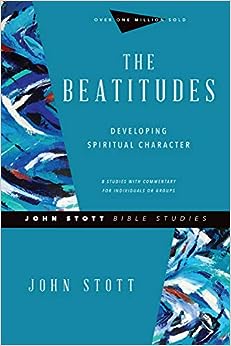This week we will be discussing the third Beatitude: Blessed are the Meek, For They shall Inherit the Earth. Matthew 5:5. Please read through and answer the questions in chapter three of John Stott’s The Beatitudes – Developing Spiritual Character. Stott’s questions will guide our discussions on Tuesday.
The word used by Matthew that is translated as “meek” is the Greek word “praus”. This is the same word that Aristotle used in describing a good temper in his Nicomachaen Ethics, (Book IV, chapter 5) in about 350 B.C. Please read this excerpt from Aristotle’s Ethics. For Aristotle, a virtue is that disposition which is the mean between the vicious or viceful extremes of excess and deficiency. For example, the virtue of courage is the mean between the extreme of having an excess of fearfulness which is the vice of cowardice and a deficiency of fear which is the vice of rashness. In regards to anger, “praus” (which is usually translated as gentleness, meekness, or good temper) is that mean between the vice of extreme anger called wrathfulness or the vice of a lack of anger called apathy. For Aristotle, this virtue of meekness is “the man who is angry at the right things and with the right people, and, further, as he ought, when he ought, and as long as he ought, is praised. This will be the good-tempered man, then, since a good temper is praised. For the good-tempered man tends to be unperturbed and not to be led by passion, but to be angry in the manner, at the things, and for the length of time, that the rule dictates; but he is thought to err rather in the direction of deficiency; for the good-tempered man is not revengeful, but rather tends to make allowances.” It is this virtue that gives us the disposition to most effectively guide our relationships with others especially when disputes arise.
In his commentary on this Beatitude, Martin Luther echos Aristotle and instructs us that having this meek disposition allows us to live in community and to keep what we have with peace and good conscience. Otherwise, we are given over to a “racket and rumpus” which may cause us to lose that which we have, especially peace. Therefore, it is the meek that inherit the earth. For we only need to observe “those queer characters that are always quarreling and disputing about property and other matters, and yielding to nobody, but are determined to rush everything through, whether they do not squander more by quarreling and contending than they could ever gain, and at last lose land and people, house and home, with unrest and a bad conscience besides.” This Beatitude isn’t a great spiritual teaching but a very practical observance that we should keep.
If you have the opportunity, I would also encourage you to read through Kenneth Bailey’s explanation of the meaning of the word “earth” and think through whether this messianic understanding of this word is relevant to us today.
Dinner is at 6. The menu is hamburgers. Discussion about 6:45. Hope to see you here and please bring a friend.
Be still before the Lord *
Psalm 37:7-12
and wait patiently for him.
Do not fret yourself over the one who prospers, *
the one who succeeds in evil schemes.
Refrain from anger, leave rage alone; *
do not fret yourself; it leads only to evil.
For evildoers shall be cut off, *
but those who wait upon the Lord shall possess the land.
In a little while the wicked shall be no more; *
you shall search out their place, but they will not be there.
But the lowly shall possess the land; *
they will delight in abundance of peace.

